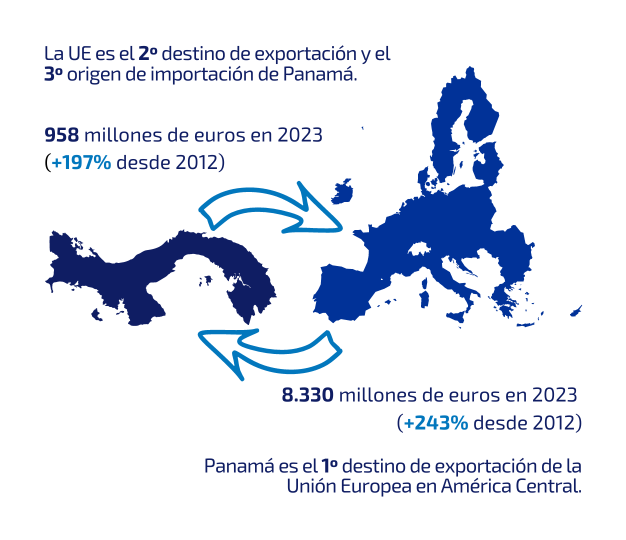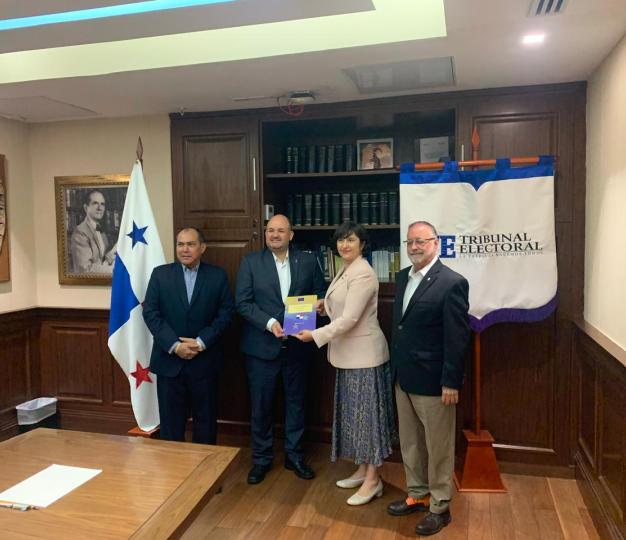The European Union and Panama
The relations between the European Union and Panama were established in 1966 and have evolved ever since. In 2015, a significant step was taken with the strengthening of cooperation, which led to the creation of an EU diplomatic mission in Panama in 2018. Through this Delegation, the EU is promoting bilateral relations and cooperation in areas such as climate action, education, security, as well as trade. In 2021, a Memorandum of Understanding was signed to enhance political dialogue between the two parties, reflecting Panama's growing importance in the Latin American and Caribbean region.
Section map
Political dialogue
Political relations between Panama and the European Union are framed within the EU-Central America Association Agreement and the broader EU-Latin America and the Caribbean (EU-LAC) partnership. This agreement, signed in 2012, focuses on political dialogue, cooperation, and the creation of a free trade area. The political and cooperation pillars of the agreement entered into force in May 2024. Through this framework, Panama and the EU engage in ongoing discussions on key issues such as human rights, democracy, climate change, and combating organized crime. High-level dialogue has been a key feature of their relationship, with recent visits by EU officials and Panamanian representatives. Additionally, Panama plays a vital role in multilateral forums like the United Nations and contributes to international governance. The EU-Panama Memorandum of Understanding on Bilateral Consultations, signed in 2021, further strengthened their bilateral relations, paving the way for deeper collaboration in global and regional issues.
Trade and investment
Panama and the European Union maintain strong economic ties that have contributed to the country's rapid growth. The EU supports Panama's development by fostering free trade and equitable competition. The EU-Central America Association Agreement, in place since 2013, has boosted commercial flows, allowing Panama to diversify its exports and attract more European investments. As a result, the EU is Panama's second-largest export destination, including minerals, fruits like bananas, and machinery. The EU also imports chemicals, pharmaceuticals, and machinery from Panama. Furthermore, the EU's Global Gateway investment initiative is helping to promote sustainable infrastructure and energy projects in Panama, supporting greater regional economic integration and development. In Panama, the most outstanding projects under Global Gateway program are the Regional Data Centre CopernicusLAC, and the Universal access to energy in the Ngäbe-Buglé region. The EU sees Panama as an essential player concerning regional integration, especially through the Panama Canal, which is also why the EU in Panama also helps regional integration and reducing barriers to intraregional trade to strengthen the competitiveness of the region and its ability to attract investment.
Security, migration and humanitarian aid
The European Union supports Panama in addressing security, migration, and humanitarian issues. In the security sector, Panama is involved in international projects to combat organized crime, human trafficking, cybercriminality, and illicit trafficking. One notable initiative is the EL PAcCTO 2.0, which aims to strengthen justice and security institutions in the region. For humanitarian aid, the EU has allocated over €12.4 million to Panama for disaster response and preparedness since 1996, including funding for the 2024 floods. Additionally, the EU provides support for migrants through humanitarian aid in the Darien region.
Democracy, Human Rights and civil society
Relations between the European Union and Panama are based on shared values such as democracy, human rights, the rule of law, and multilateralism. The EU actively supports the improvement of democratic institutions in Panama, promoting citizen participation and government transparency. A key aspect of its cooperation is the Global Action Plan for Democracy and Human Rights 2020-2027, which includes the protection of fundamental rights and the building of democratic and inclusive societies. Regarding civil society, the EU implements a Roadmap for Engagement with Civil Society in Panama 2023-2027, strengthening relations with civil society organizations and promoting citizen participation in national policies. Furthermore, the EU will support the 2024 general elections through an Electoral Expert Mission, aimed at evaluating the electoral process and ensuring its alignment with best democratic practices.
Cultural and interpersonal exchanges
The EU Delegation in Panama works to strengthen the ties between societies and foster joint action in the face of global challenges. Key activities include the annual Europe Day celebrations, the European Film Week, Women's Day Jazz Night and the Christmas Concert, bringing together the community together to enjoy and learn about both cultures. In addition, cultural and interpersonal relations between the European Union and Panama have been strengthened with important initiatives aimed at youth: Altavoz Juvenil allows young Panamanians to express themselves on relevant issues and to actively participate in political and actively participate in the political and social life of their country. Team Europe is a network of young people working on joint projects between the EU and Panama, focusing on areas such as climate change, social inclusion and human rights. These initiatives strengthen the ties between the EU and Panama, promoting a more equitable and sustainable future for new generations.





